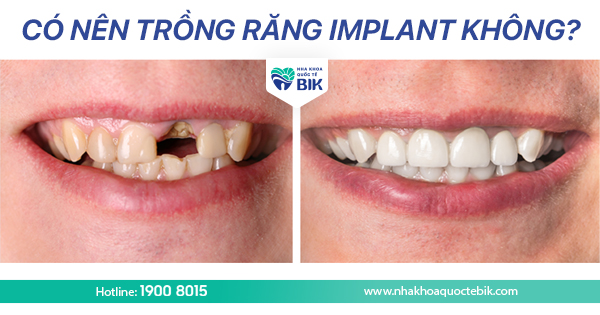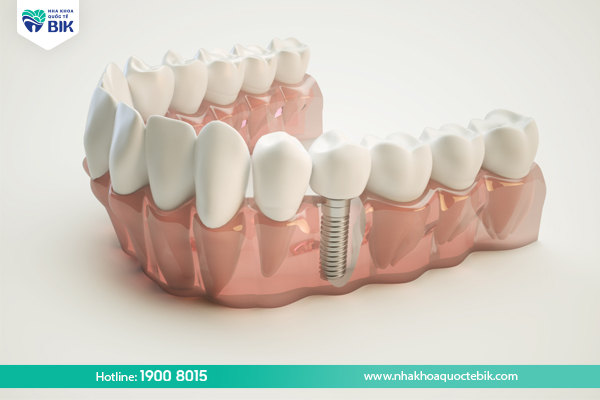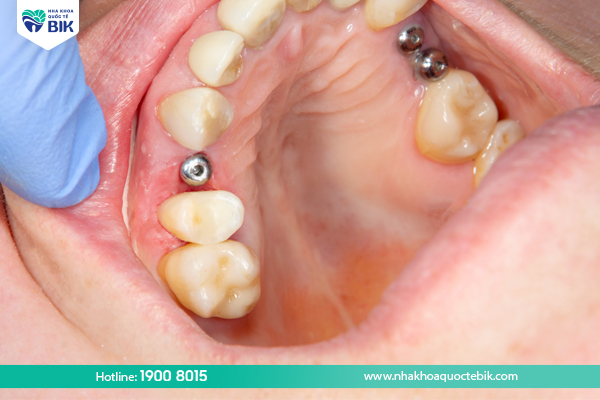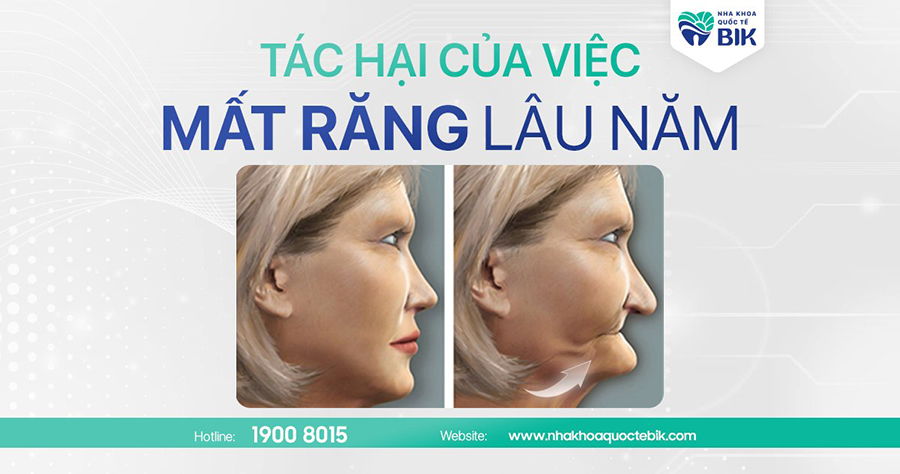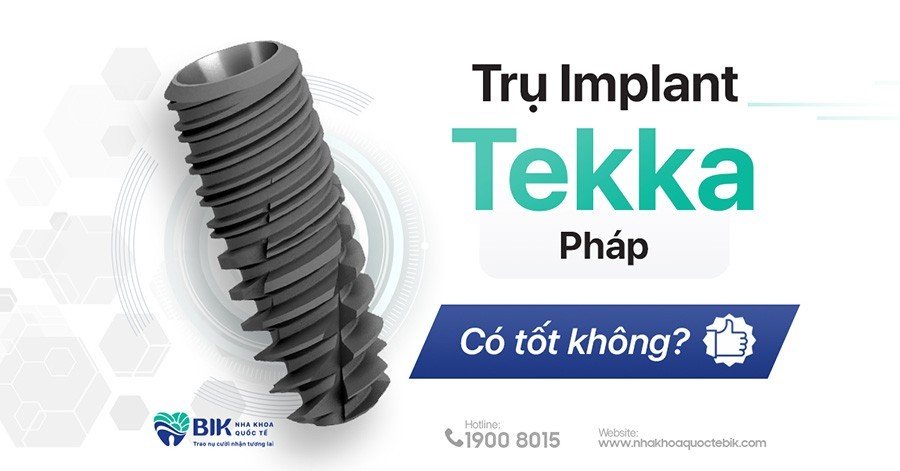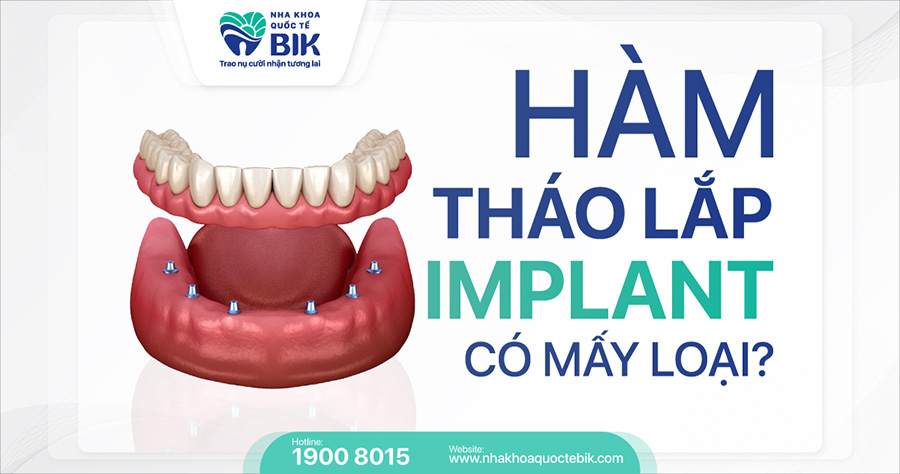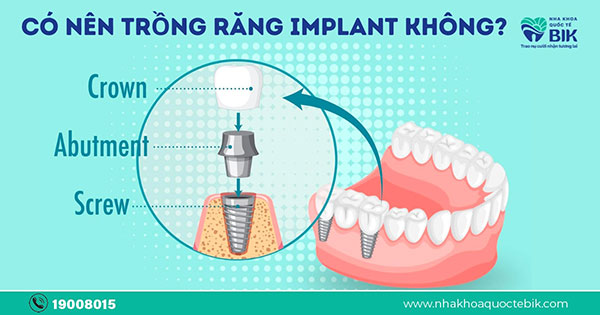
Does dental implant affect health? In essence, dental implant is a method of tooth restoration that does not cause any health effects. Not only that, if performed correctly, meticulously and accurately, this is the optimal solution to help prevent the consequences of tooth loss. On the contrary, if the implant surgery has even the smallest error, it can lead to serious complications later.
1. Should I get dental implants?
Implantation is a very popular restoration method in our country today. With this method, the missing real tooth will be replaced with a fake tooth made up of 3 main parts: Implant pillar, Abutment joint and Porcelain crown. In which, the Implant pillar will act as an artificial tooth root firmly inserted into the jaw bone. The Implant pillar has the function of supporting the porcelain crown attached above through the Abutment joint.
Implant dentistry is a relatively difficult and complicated technique, but can bring the following outstanding benefits:
1.1. Restoring aesthetics
Thanks to its structure being completely similar to a real tooth in terms of shape, size and color, aesthetics will be completely restored after implanting the tooth.
1.2. Ensuring chewing ability
The Implant pillar will be firmly inserted into the jaw and the porcelain crown can withstand 5 times more force than a real tooth. This can help customers comfortably use their favorite foods without having to abstain too much for fear of affecting the dentures.
1.3. Safe, benign
The implant post inserted into the jawbone is made of high-grade Titanium. This is a material widely used in the dental industry and has been tested to be completely benign, safe and harmless to oral health. Titanium is also a factor that helps the implant post to be compatible and stable in the jawbone for a long time, and can last forever if properly cared for.
1.4. Prevent jawbone loss
The reason the jawbone develops well and normally is thanks to the force of the chewing process. In case of tooth loss, the jawbone will gradually disappear because it is no longer provided with the force to develop normally. Implant dentistry can prevent this condition because the implant post transmits regular chewing force to stimulate jawbone growth.
2. Does dental implant affect health?
In fact, if performed at a reputable dental clinic, dental implant is quite safe and does not pose a health risk, but if the following factors are not ensured, it can easily lead to unwanted complications:
2.1. Doctor’s skills
The skills of the doctor performing the surgery are the most important factor in determining the success of the dental implant surgery. If the doctor does not meet the requirements in terms of expertise or experience, the diagnosis of the disease may be wrong, and the treatment plan given may be incorrect. Dental implant is a very difficult and complicated technique, requiring the doctor’s precision and meticulousness, so any mistake, no matter how small, can lead to serious complications later.
2.2. Implant pillar quality
The implant pillar used must be guaranteed to be genuine and made from pure Titanium to have good durability, load-bearing capacity and compatibility with the jawbone. If a poor quality implant pillar is inserted into the jawbone, it will cause many complications affecting oral health and the most serious is that the implant pillar will be rejected.
2.3. Health status
Customers need to have a general examination before implant surgery to ensure the safety of the surgery. In addition, customers must not use stimulants such as alcohol, tobacco, etc. for at least 2 months before implant surgery to avoid complications during the procedure.
3. Complications that may occur when implanting teeth
If the dental implant is performed by an unskilled doctor, it may lead to the following complications:
3.1. Prolonged bleeding
Bleeding at the implant site after implantation is normal and will stop after 1-2 days. At this time, the customer can use a piece of gauze and fix it at the implant site for about 30 minutes to stop the bleeding. If after this time the bleeding does not stop, the customer needs to see a doctor for treatment. The cause may be that the wound is stitched too tightly, the stitching material is of poor quality, or the implant has not yet integrated into the jawbone before the doctor has attached the porcelain tooth.
3.2. Infection
Infection with swelling is the most common complication after implant placement. The main cause is that the teeth and mouth are not cleaned thoroughly. Leftover food particles in the oral cavity are a favorable environment for bacteria to grow and attack the wound. If not detected in time, it can cause severe inflammation, leading to bone loss and the implant being expelled.
3.3. Bone loss at the implant neck
This condition causes the implant to be exposed, causing loss of aesthetics. If not treated promptly, this phenomenon will progress more severely, causing the implant to become loose, causing gingivitis, bad breath and affecting the surrounding teeth.
3.4. Jaw bone damage
This condition occurs when the patient does not have enough jaw bone or the jaw bone is not thick enough, but the doctor does not perform bone grafting before implanting the tooth. At this time, the success of the surgery will be affected and the cost of treatment will also increase.
3.5. Affected nerve
During the process of drilling the implant hole, if the doctor performs the procedure incorrectly, it can affect the nerve under the alveolar bone. At this time, the customer may feel pain, numbness or itching in the gums, tongue, lips. If this condition is more severe, the implant may have to be removed and replaced with another tooth.
3.6. Rejected implant
The implant being rejected from the jawbone is the worst case that can happen after implantation, and this is the result of all of the above conditions. In most cases of rejected implant teeth, a new implant needs to be replaced, which takes more time and money. Therefore, customers need to choose a reputable, quality dental facility to perform implant placement.
4. Conditions for absolutely safe dental implant placement
To ensure safety when implanting an implant, customers need to meet the following criteria:
4.1. Strong jawbone
Because the implant is inserted directly into the jawbone, the condition of the jawbone greatly affects the success of the implant. To avoid unnecessary damage, the jawbone needs to be wide and deep enough, not deformed and not sunken. The doctor will prescribe bone grafting and sinus lift if necessary. Therefore, in this case, the patient should proceed with dental implant after about 1 month. This is the ideal time because the wound has completely healed and the jawbone is still strong, not yet degraded and is eligible for dental implant.
4.2. Stable overall health
Dental implant also requires customers to be in good health to ensure absolute safety. Dental implant recipients absolutely must not suffer from chronic diseases such as cardiovascular disease, diabetes, high blood pressure, … and are contraindicated for pregnant women. In addition, the appropriate age for dental implant is from 18 years old when the jawbone system has stabilized.
4.3. Ensure oral health
Some oral diseases such as tooth decay, gingivitis, periodontitis, pulpitis, … need to be thoroughly treated before dental implant to ensure safety.
5. Criteria for choosing a safe dental implant clinic
A reputable, quality dental clinic must meet the following criteria:
5.1. Operating license
The dental clinic must have a full operating license issued by the Department of Health, the doctor must have a practice certificate, and a professional degree in Implant transplantation.
5.2. A team of good doctors
The most important factor determining whether or not dental implants affect health is the doctor’s expertise and skills. If the doctor is not trained in Implant transplantation or does not have much experience, it can lead to some errors such as: Misdiagnosis of oral health, incorrect placement of the implant, misaligned implant, etc.
5.3. Modern equipment
Because it is a complex technique, the support of modern equipment and technology in the Implant transplantation process is indispensable. Dental clinics need to be fully equipped with machinery systems such as: Ultrasonic bone cutters, 3D ConeBeam CT scanners, centrifuges, etc. to ensure that the implantation process is more accurate and faster.
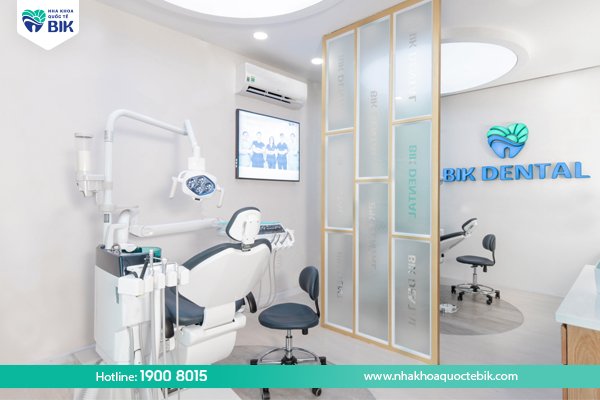
5.4. Use genuine materials
To ensure that health is not affected, the quality of the Implant used is also a very important factor. Customers should choose a dental clinic that commits to importing genuine Implant pillars from abroad and conducting inspections before putting them into use. Some of the high-end Implant pillars used at BIK International Dental Clinic include: Straumann Implant pillar (Switzerland), Neodent Implant pillar (Switzerland), Nobel Biocare Implant pillar (USA), Osstem Implant pillar (Korea),… with transparent and clear costs.
5.5. International standard dental implant procedure
The dental implant procedure at the dental clinic, from examination, consultation to implant placement, must be carried out according to international standards. At the same time, the dental clinic needs to carry out strict disinfection and sterilization steps according to the regulations of the Ministry of Health to avoid cross-infection.
Therefore, dental implants are a very safe dental restoration solution that effectively prevents the consequences of tooth loss. In fact, this is a highly difficult technique, so whether it affects health or not depends largely on the skill of the doctor performing it. Therefore, customers should choose reputable dental facilities with a team of doctors and experts with extensive experience in implant surgery.

